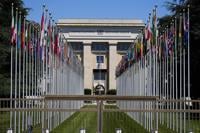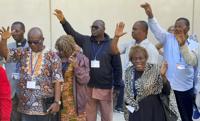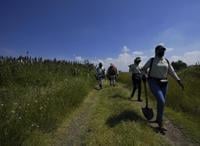LONDON (AP) — When her husband fled China in 2019 to escape a police crackdown on dissidents, Lu Lina thought she and their young son could soon join him in safety abroad.
She did not know that she would be forced to move house, that her 8-year-old son would be effectively kicked out of school and that border police would block her from leaving the country over the next three years. In the end, the couple had to resort to filing for divorce in China to get around the exit ban.
“After my husband left, police gave our lives so much trouble,” Lu said from Los Angeles, where the family eventually reunited and settled late last year. “Every time the border guards would stop me, take away my phone, my wallet and all my things. They gave no explanation.”
Lu’s husband, Liu Sifang, a musician and former teacher, was among a number of Chinese activists and rights lawyers who were either arrested, forced into hiding or self-exiled after attending an informal get-together in 2019 to discuss human rights.
Rights groups say the punishment of Liu’s family highlights Beijing’s increasingly harsh crackdown on dissent both within China and beyond. As the groups mark the 75th anniversary of the U.N. Universal Declaration of Human Rights on Sunday, they fear that the situation in the world’s second most populous country is getting worse, not better.
Western governments are failing to press China hard enough, the rights groups say, and a more powerful China under President Xi Jinping has become more impervious to international pressure.
“If you look at independent activism around the time that Xi came to power, relative to what you can see now, what’s disturbingly clear is that Xi’s leadership sought to obliterate civil society and to silence dissent, not just inside the country but globally, to ensure that anybody who criticizes him and the regime has to think twice,” said Sophie Richardson, a longtime China observer and former China director at Human Rights Watch.
A new report by the Rome-based rights group Safeguard Defenders, published Sunday to mark International Human Rights Day, alleges that China’s government has stepped up its use of “collective punishment” against the loved ones of human rights advocates in recent years.
“Under Xi Jinping, China is increasingly unwilling to allow political targets to leave the country, slapping them and their families with exit bans, and using transnational repression methods to control the ones who make it out,” according to the report.
The report, based on interviews with more than a dozen rights activists and compiled media reports, said it identified at least 50 such cases from 2015 to 2022, including the detention, home eviction, harassment or violent assault of activists’ family members.
This year's International Human Rights Day — marking 75 years since the United Nations adopted the global foundational document for protecting the rights of every individual everywhere — comes just days after .
While the summit focused on trade and the Ukraine war, the EU said that the bloc also expressed its “deep concerns” about the rights situation in China. Both sides said they welcomed the resumption of their human rights dialogue earlier this year.
Wang Lutong, head of European affairs at the Chinese Foreign Ministry, said Beijing was willing to continue the dialogue — though he also warned that “human rights should not be used as a stick to beat China.”
Last week, Foreign Minister Wang Yi reiterated China's longstanding defense against international criticism of its human rights record. Beijing opposes “any attempt to force one's own values and model upon others,” he told a symposium.
“We must reject any attempt to interfere in other countries’ internal affairs or contain their development under the pretext of human rights,” he said. “China has ... opened a new path for human rights development that adapts to the changing times and suits our national conditions.”
Richardson, the China rights expert, said the EU-China rights dialogue falls far short of accomplishing real outcomes for dissidents.
“It's what the political establishment prefers because it doesn’t upset Beijing too much,” she said. “It's the deliverable that people can point at and say, ‘we did that.’”
In April, Chinese police detained Yu Wensheng, a human rights lawyer, and his wife Xu Yan as they were on their way to the European Union office in Beijing to meet with the EU ambassador.
The couple is facing charges of subversion of state power and “picking quarrels and stirring up troubles” — though they haven’t received any legal documents outlining the charges, according to Bao Longjun, a legal advocate familiar with the case.
Such vague charges are commonly leveled against rights activists in China, and rights groups have noted an increase this year in cases like Yu's. He and his wife remain in detention.
Other Chinese rights advocates, such as disbarred human rights lawyer continue to face harassment from authorities even after they have been released from prison.
Liu, the dissident who fled to the United States, described how tough it was being separated from his wife and son for three years. The couple has now remarried in the U.S.
“Those law-enforcement officials, they used such cruel methods to retaliate against me because I managed to get out,” he said. “They are showing people like us that this is what we can do to you and your family.”
___
Wu reported from Bangkok. Associated Press writer Ken Moritsugu in Beijing contributed to this report.








































